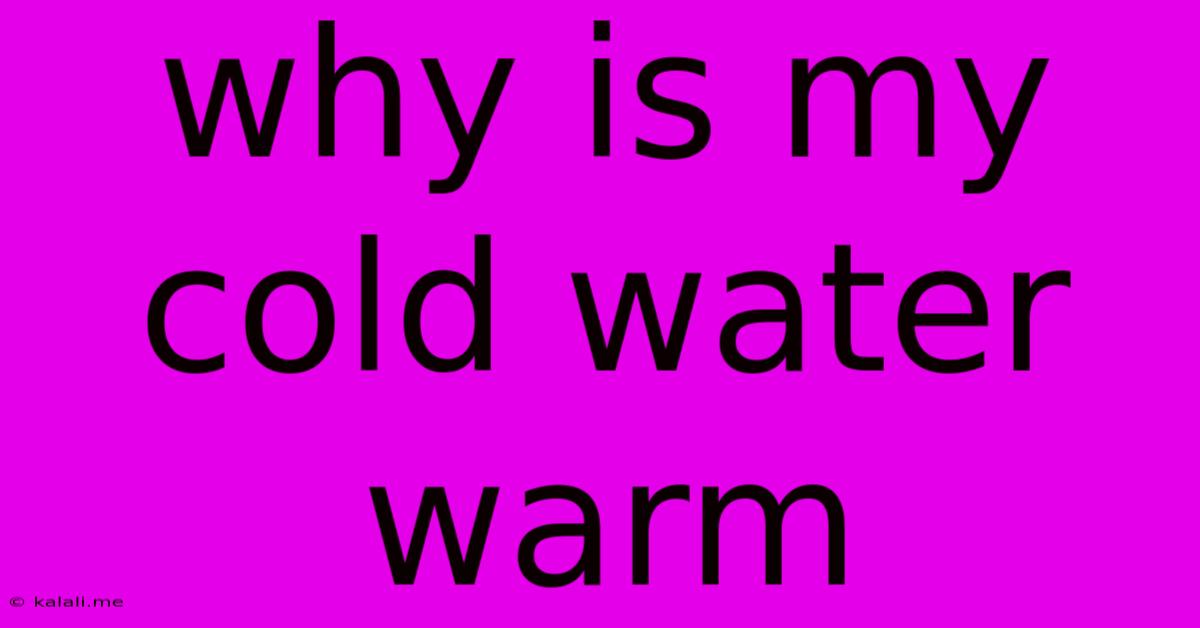Why Is My Cold Water Warm
Kalali
May 24, 2025 · 3 min read

Table of Contents
Why Is My Cold Water Warm? Troubleshooting Lukewarm Taps
Having lukewarm water coming from your cold tap is frustrating. A refreshing cold drink or a cool shower suddenly becomes a lukewarm disappointment. This problem can stem from various sources, from simple fixes you can handle yourself to more complex issues needing a plumber's expertise. Let's dive into the common culprits and how to troubleshoot this annoying problem.
Understanding Your Water Heating System
Before we troubleshoot, it's helpful to understand the basics of your home's water heating system. Most homes use a tank-style or tankless water heater. Understanding which type you have will help narrow down the possibilities. Tank-style heaters store heated water, while tankless heaters heat water on demand.
Common Causes of Warm Cold Water
Several factors can contribute to lukewarm cold water:
-
Mixing Valves: This is often the simplest and most common reason. Mixing valves are designed to blend hot and cold water, usually found at the tap itself or within the plumbing system. A malfunctioning mixing valve can allow too much hot water to mix with the cold, resulting in lukewarm water.
-
Hot Water Recirculation System: Many homes have a hot water recirculation pump that keeps hot water circulating in the pipes to reduce wait time for hot water. If this system malfunctions or is improperly installed, it can cause hot water to backflow into the cold water lines.
-
Temperature Setting on Your Water Heater: While this affects the overall hot water temperature, an excessively high setting on your water heater can lead to the cold water lines getting warmer through proximity and heat transfer. Check the temperature dial on your water heater. The ideal temperature is generally between 120-130°F (49-54°C).
-
Low Water Pressure: Low water pressure can also lead to warm cold water. When the pressure is low, the water may not flow quickly enough to prevent heat transfer from the hot water pipes.
-
Cross-Connection: This is a more serious issue where the hot and cold water lines are accidentally crossed or improperly connected within the walls or under the sink. This requires professional plumbing assistance.
-
Faulty Water Heater: A malfunctioning water heater, especially a tank-style one, can cause heat to seep into the cold water lines. Signs of a faulty water heater include unusual noises, leaking, or inconsistent hot water temperature.
-
Sediment Buildup in the Water Heater Tank (Tank-Style Only): Over time, sediment builds up at the bottom of tank-style water heaters. This sediment can interfere with efficient heating, leading to higher overall water temperatures and indirectly affecting the cold water.
Troubleshooting Steps
-
Check the Mixing Valve: Try adjusting the temperature control on the faucet to see if that resolves the issue. If it doesn't, the mixing valve itself might need replacement or repair.
-
Inspect the Hot Water Recirculation System (if applicable): If your home has this system, examine it for any issues or improper installation. Consider turning it off temporarily to see if that improves the cold water temperature.
-
Adjust Water Heater Temperature: Lower the temperature setting on your water heater if it's too high.
-
Check Water Pressure: Use a pressure gauge to determine if your water pressure is too low. If it is, contact your local water utility company.
-
Listen for Unusual Noises from the Water Heater: If you hear unusual noises, it could signal a problem that needs professional attention.
-
Check for Leaks: Any leaks around the water heater can be an indicator of a more significant problem.
When to Call a Plumber
If the problem persists after trying these troubleshooting steps, or if you suspect a cross-connection or more serious plumbing issue, it's best to call a qualified plumber. They possess the expertise to diagnose and repair complex problems safely and effectively.
By systematically checking these potential causes, you'll be well on your way to solving the mystery of your lukewarm cold water and enjoying refreshing cold water once more.
Latest Posts
Latest Posts
-
Abarbaner Questions On Balak In English
May 24, 2025
-
How To Remove A Broken Wood Screw
May 24, 2025
-
Blender Center Object On Another Object
May 24, 2025
-
Disciples Doubt They Can Feed The Crowd Twice
May 24, 2025
-
End Ssh Session Return To Screen Session
May 24, 2025
Related Post
Thank you for visiting our website which covers about Why Is My Cold Water Warm . We hope the information provided has been useful to you. Feel free to contact us if you have any questions or need further assistance. See you next time and don't miss to bookmark.